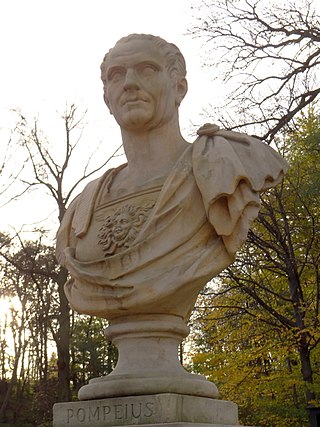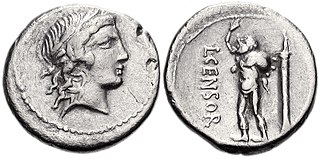Related Research Articles
Publius Clodius Pulcher was a populist Roman politician and street agitator during the time of the First Triumvirate. One of the most colourful personalities of his era, Clodius was descended from the aristocratic Claudia gens, one of Rome's oldest and noblest patrician families, but he contrived to be adopted by an obscure plebeian, so that he could be elected tribune of the plebs. During his term of office, he pushed through an ambitious legislative program, including a grain dole; but he is chiefly remembered for his long-running feuds with political opponents, particularly Cicero, whose writings offer antagonistic, detailed accounts and allegations concerning Clodius' political activities and scandalous lifestyle. Clodius was tried for the capital offence of sacrilege, following his intrusion on the women-only rites of the goddess Bona Dea, purportedly with the intention of seducing Caesar's wife Pompeia; his feud with Cicero led to Cicero's temporary exile; his feud with Milo ended in his own death at the hands of Milo's bodyguards.

The gens Claudia, sometimes written Clodia, was one of the most prominent patrician houses at ancient Rome. The gens traced its origin to the earliest days of the Roman Republic. The first of the Claudii to obtain the consulship was Appius Claudius Sabinus Regillensis, in 495 BC, and from that time its members frequently held the highest offices of the state, both under the Republic and in imperial times.

The gens Licinia was a celebrated plebeian family at ancient Rome, which appears from the earliest days of the Republic until imperial times, and which eventually obtained the imperial dignity. The first of the gens to obtain the consulship was Gaius Licinius Calvus Stolo, who, as tribune of the plebs from 376 to 367 BC, prevented the election of any of the annual magistrates, until the patricians acquiesced to the passage of the lex Licinia Sextia, or Licinian Rogations. This law, named for Licinius and his colleague, Lucius Sextius, opened the consulship for the first time to the plebeians. Licinius himself was subsequently elected consul in 364 and 361 BC, and from this time, the Licinii became one of the most illustrious gentes in the Republic.
Gnaeus Octavius was a Roman senator who was elected consul of the Roman Republic in 87 BC alongside Lucius Cornelius Cinna. He died during the chaos that accompanied the capture of Rome by Cinna and Gaius Marius.
Lucius Licinius Crassus was a Roman orator and statesman who was a Roman consul and censor and who is also one of the main speakers in Cicero's dramatic dialogue on the art of oratory De Oratore, set just before Crassus' death in 91 BC. He was considered the greatest orator of his day by his pupil Cicero.

The gens Pompeia was a plebeian family at ancient Rome, first appearing in history during the second century BC, and frequently occupying the highest offices of the Roman state from then until imperial times. The first of the Pompeii to obtain the consulship was Quintus Pompeius in 141 BC, but by far the most illustrious of the gens was Gnaeus Pompeius, surnamed Magnus, a distinguished general under the dictator Sulla, who became a member of the First Triumvirate, together with Caesar and Crassus. After the death of Crassus, the rivalry between Caesar and Pompeius led to the Civil War, one of the defining events of the final years of the Roman Republic.

The gens Marcia, occasionally written Martia, was one of the oldest and noblest houses at ancient Rome. They claimed descent from the second and fourth Roman Kings, and the first of the Marcii appearing in the history of the Republic would seem to have been patrician; but all of the families of the Marcii known in the later Republic were plebeian. The first to obtain the consulship was Gaius Marcius Rutilus in 357 BC, only a few years after the passage of the lex Licinia Sextia opened this office to the plebeians.
The gens Terentia was a plebeian family at ancient Rome. Dionysius mentions a Gaius Terentius Arsa, tribune of the plebs in 462 BC, but Livy calls him Terentilius, and from inscriptions this would seem to be a separate gens. No other Terentii appear in history until the time of the Second Punic War. Gaius Terentius Varro, one of the Roman commanders at the Battle of Cannae in 216 BC, was the first to hold the consulship. Members of this family are found as late as the third century AD.
The gens Octavia was a plebeian family at ancient Rome, which was raised to patrician status by Caesar during the first century BC. The first member of the gens to achieve prominence was Gnaeus Octavius Rufus, quaestor circa 230 BC. Over the following two centuries, the Octavii held many of the highest offices of the state; but the most celebrated of the family was Gaius Octavius, the grandnephew and adopted son of Caesar, who was proclaimed Augustus by the senate in 27 BC.
Licinia is the name used by ancient Roman women of the gens Licinia.

Marcius Censorinus was a name used by a branch of the plebeian gens Marcia of ancient Rome. The cognomen Censorinus was acquired through Gaius Marcius Rutilus, the first plebeian censor, whose son used it. The gens Marcia claimed descent from both Ancus Marcius, a king of Rome, and symbolically from Marsyas the satyr, who was associated with free speech and political liberty; see further discussion at Prophecy and free speech at Rome. The Marcii Censorini were consistent populares, supporting Marius, Cinna, Julius Caesar, and Antonius.

The gens Annia was a plebeian family at ancient Rome. Livy mentions a Lucius Annius, praetor of the Roman colony of Setia, in 340 BC, and other Annii are mentioned at Rome during this period. Members of this gens held various positions of authority from the time of the Second Punic War, and Titus Annius Luscus attained the consulship in 153 BC. In the second century AD, the Annii gained the Empire itself; Marcus Aurelius was descended from this family.

The gens Antonia was a Roman family of great antiquity, with both patrician and plebeian branches. The first of the gens to achieve prominence was Titus Antonius Merenda, one of the second group of Decemviri called, in 450 BC, to help draft what became the Law of the Twelve Tables. The most prominent member of the gens was Marcus Antonius.
The gens Appuleia, occasionally written Apuleia, was a plebeian family at ancient Rome, which flourished from the fifth century BC into imperial times. The first of the gens to achieve importance was Lucius Appuleius, tribune of the plebs in 391 BC.
Lucius Marcius Censorinus was a consul of the Roman Republic in 39 BC, during the Second Triumvirate. He and his colleague Gaius Calvisius Sabinus had been the only two senators who tried to defend Julius Caesar when he was assassinated on the Ides of March in 44 BC, and their consulship under the triumvirate was a recognition of their loyalty.

The gens Lucretia was a prominent family of the Roman Republic. Originally patrician, the gens later included a number of plebeian families. The Lucretii were one of the most ancient gentes, and the second wife of Numa Pompilius, the second King of Rome, was named Lucretia. The first of the Lucretii to obtain the consulship was Spurius Lucretius Tricipitinus in 509 BC, the first year of the Republic.
Gaius Marcius Censorinus was a late Roman Republican politician and soldier who participated in the first civil war of the Roman Republic, against Sulla.
References
- ↑ Claude Eilers, "The Date of Augustus' Edict on the Jews (Jos. AJ 16.162–165) and the Career of C. Marcius Censorinus," Phoenix 58 (2004), p. 92.
- ↑ Michael Lovano, The Age of Cinna (Franz Steiner, 2002), passim, limited preview online.
- ↑ Plutarch, Crassus 25.3, 11–12.
- ↑ Cicero, Ad Quintum fratrem 1.2.13; Eilers, "The Date of Augustus' Edict on the Jews … and the Career of C. Marcius Censorinus," p. 92. D.R. Shackleton Bailey notes in his commentary that the person in Cicero's letter could less likely be the Lucius Marcius Censorinus who was consul in 29 BC; he further doubts that all four illustrious young men listed would actually be part of Quintus's entourage.
- ↑ According to Velleius Paterculus 2.14.3.